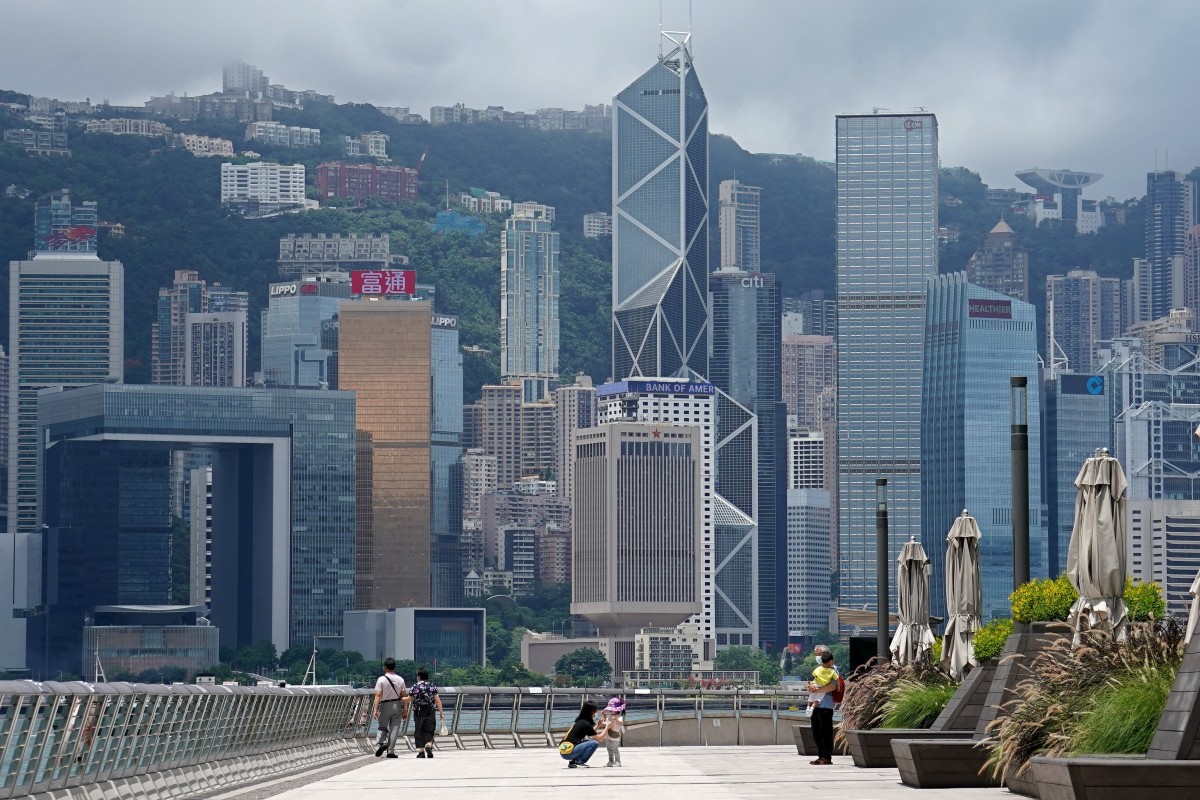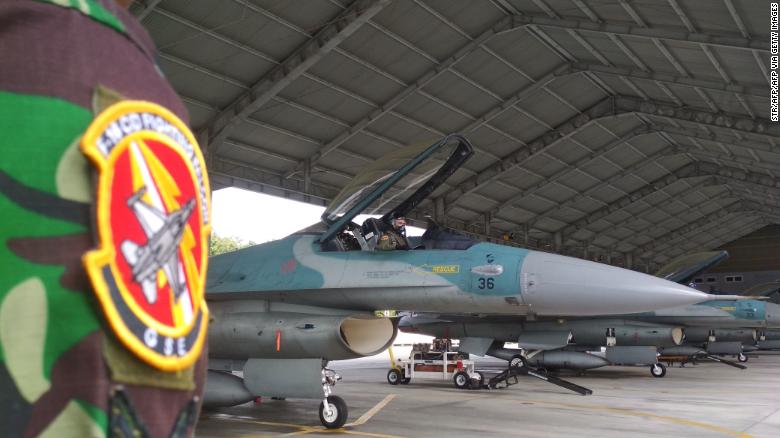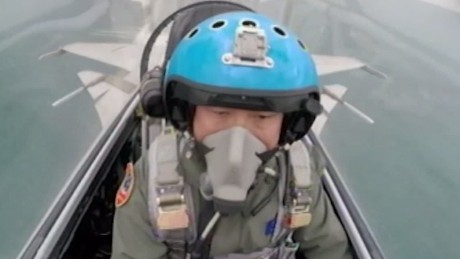The South China Sea is one of the most hotly contested regions in the world, with competing claims from China, Vietnam, Philippines, Malaysia, Brunei and Taiwan and Indonesia.
Beijing's territorial claims, known as the nine-dash line -- owing to the markings printed on Chinese maps of the region -- are by far the largest and encompass almost the entirety of the sea, from Hainan Island down to the top of Indonesia. China's claims have no basis under international law and were found to be invalid in a 2016 international court ruling.
Despite this, from about 2015 the Chinese government began to bolster its territorial ambitions by building artificial islands on reefs and shoals in the South China Sea, and then militarizing them with aircraft strips, harbors and radar facilities.
"These (islands) are bristling with radar and surveillance capabilities, they see everything that goes on in the South China Sea," Poling said. "In the past, China didn't know where you were drilling. Now they certainly do."
Experts say Beijing has created an armada of coast guard and Chinese fishing vessels that can be deployed in the South China Sea to harass other claimant's ships or sail in politically sensitive areas.
Growing aggression
The confrontation over the Malaysian drill ship wasn't the first act of aggression by the Chinese government in the region in 2020.
The year began with a standoff in the Natuna Islands on the far southern end of the South China Sea, territory claimed by China and Indonesia. Vessels from both countries were involved in the standoff, which began when Chinese fishing vessels started to operate inside Indonesia's exclusive economic zone.
Eventually, Indonesia deployed F-16 fighters and naval ships to the islands and President Joko Widodo personally flew to the area, in an unusual show of strength from the country.
In April, a Chinese maritime surveillance vessel rammed and sank a Vietnamese fishing boat near
the disputed Paracel Islands in the South China Sea.
The act prompted Vietnam to send a diplomatic note to the United Nations restating its sovereignty over its exclusive economic zone in the South China Sea. Foreign Ministry spokesman Geng Shuang responded by saying China would take "all measures necessary" to safeguard Beijing's interests in the region.
"I want to stress this: attempts by any country to negate in any means China's sovereignty, rights and interests in the South China Sea and to reinforce its own illegal claim are bound to be fruitless," Geng said.
Insecurity
Beijing has a long history of harassing other countries' vessels in the South China Sea, mostly from Vietnam and the Philippines and also occasionally from Malaysia and Indonesia.
In the past, Chinese diplomats have helped soothed aggrieved parties, but experts say the fallout from the coronavirus and the rise of so-called "wolf warrior" diplomacy in Beijing have removed any circuit breaker in the relationship between China and its regional rivals.
"What has changed is that they've really taken the glove off of the fist diplomatically. The statements are brash and unhelpful," said Poling.
Experts said Beijing's growing forcefulness in the region is partly driven by the global coronavirus pandemic, which has dealt a heavy blow to China's rapid economic growth and damaged the country's international reputation.
At the meeting of its parliament in May, the Chinese government didn't set a target for annual GDP growth for the first time in years, a sign that it is concerned about falling economic performance.
At the same time, tensions are rising with the United States and Europe over Beijing's role in containing the initial outbreak and whether it gave the world enough time to respond to the pandemic, which has killed more than 380,000 people.
Concerned about appearing like its grip on power is slipping, the ruling Communist Party is doubling down on its rhetoric and on its nationalistic agenda, which includes control of the South China Sea, experts said.
Beijing is keen to foster a narrative that the US is retreating as a global power to solidify its hold on the region, said Ian Storey, senior fellow at ISEAS-Yusof Ishak Institute in Singapore.
"It will want to show Southeast Asian claimants that American military power is on the decline and its commitment to the region is waning," Storey said. "(It will want to show that) the economic problems that China is facing will not impact its policy on the South China Sea."
So far, Malaysia and Indonesia have tried to avoid letting South China Sea dominate their relationship with China, but with Beijing marking its territory in the region, the days of quiet diplomacy might not last forever.
"At what level of aggression does it become impossible to ignore? ... At what point do they add their voice to the criticism that you've been getting for years and years from Hanoi and Manila?" AMTI's Poling said.
Free-for-all
Facing an entrenched Chinese presence on their doorstep, now might seem like the time for Southeast Asian nations to band together and face down Beijing's presence in the region.
But Storey said with regional powers preoccupied with coronavirus as well as their own economic and political crises, any hope of unity in the Association of Southeast Asian Nations (ASEAN) was unlikely.
"No matter how hard China pushes I don't think we're going to see the ASEAN members coalesce and present that strong united front against China," he said.
"I think going forward in the next six months, towards the end of 2020, we can expect China to double down on its assertive behavior in the South China Sea."
Malaysia has long worked to balance the benefits of a close relationship with China with running its own independent foreign policy, AMTI's Poling said, which is why previous clashes with Chinese vessels in Malaysian waters were kept out of the media as much as possible.
Indonesia has in the past opened fire on Chinese fishing vessels that failed to leave its waters, and President Widodo's tough behavior in January showed he will not sit by while Beijing moves into the Natuna Islands.
But experts say China won't be easily deterred.
"Beijing believes it can wear down Indonesian opposition; and eventually Indonesia, much like Malaysia, will realize that it has little choice but to accommodate China's presence," Foreign Policy Research Institute senior fellow Felix Chang
wrote in January.Still, there is risk too for the Chinese government. The United States is already increasing its freedom of navigation operations in the South China Sea, holding half as many in the first five months of 2020 as it did in the whole of last year.
Washington is
also working to directly support Southeast Asian nations in the South China Sea. The Malaysian Navy received its first batch of surveillance drones from the US in May.
And, during the West Capella's operations, US Navy warships performed what the US Navy called "presence operations" near the drill ship while it was being monitored by the Chinese vessels.
"The US supports the efforts of our allies and partners in the lawful pursuit of their economic interests," Vice Adm. Bill Merz, commander of the US 7th Fleet, said in a statement at the time.
Speaking in a public lecture in May, James Holmes, a professor at the US Naval War College and former Navy officer, said that as Beijing pushes harder in the South China Sea, the US may look like the better bet for a steady friend.
"I think China has actually seriously overplayed its hand by being so bullying and by being so aggressive," Holmes said.
"That starts driving together allies that are worried about Chinese aggression ... The more China pushes the more coalition partners are likely to unite and push back."
Any push back could cost Beijing economically.
China has close trade ties with many of its regional neighbors, such as the Philippines, Malaysia and Indonesia, and needs them for parts of its international agenda such as its
much trumpeted Belt and Road Initiative -- the country's interlinking web of regional trade deals and infrastructure projects.
"I think there's already been a lot of unease in the region about how China has used Covid-19 to push its claims in the South China Sea," said Storey, from ISEAS-Yusof Ishak Institute.
"China won't want to completely destroy its relations with Southeast Asia by pushing too hard."

 A 70-strong delegation of tycoons, business elites and professionals meet President Xi Jinping in the Great Hall of People on 21 September 2014. The tycoons sitting in the front row include (from left to right) Bank of East Asia chairman David Li Kwok-po; New World Development chairman Henry Cheng Kar-shun; K Wah Group chairman and Galaxy Entertainment Group founder Lui Che-woo; Wharf (Holdings) chairman Peter Woo Kwong-ching; Chairman of Kerry Group, Robert Kuok Hock Nien; Henderson Land Development chairman Lee Shau-kee; Cheung Kong (Holdings) chairman Li Ka-shing; and Tung Chee-hwa, a vice-chairman of CPPCC . Photo: HandoutA developer association representing firms including and the Kwok family’s Sun Hung Kai Properties said it backs the law because it will guarantee stability and prosperity. The families behind , Galaxy Entertainment Group and have issued similar endorsements.
A 70-strong delegation of tycoons, business elites and professionals meet President Xi Jinping in the Great Hall of People on 21 September 2014. The tycoons sitting in the front row include (from left to right) Bank of East Asia chairman David Li Kwok-po; New World Development chairman Henry Cheng Kar-shun; K Wah Group chairman and Galaxy Entertainment Group founder Lui Che-woo; Wharf (Holdings) chairman Peter Woo Kwong-ching; Chairman of Kerry Group, Robert Kuok Hock Nien; Henderson Land Development chairman Lee Shau-kee; Cheung Kong (Holdings) chairman Li Ka-shing; and Tung Chee-hwa, a vice-chairman of CPPCC . Photo: HandoutA developer association representing firms including and the Kwok family’s Sun Hung Kai Properties said it backs the law because it will guarantee stability and prosperity. The families behind , Galaxy Entertainment Group and have issued similar endorsements.








